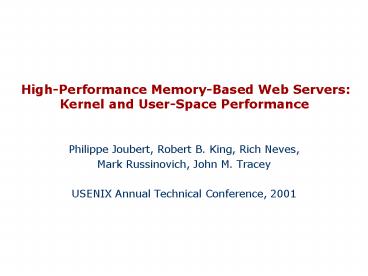HighPerformance MemoryBased Web Servers: Kernel and UserSpace Performance
1 / 12
Title:
HighPerformance MemoryBased Web Servers: Kernel and UserSpace Performance
Description:
Linux TUX. Other approaches. Lava hit-server, Cheetah Web server (MIT Exokernel) AFPA ' ... TUX. Zeus. Apache. Experimental Methodology. Performance - SPECWeb96 ... –
Number of Views:38
Avg rating:3.0/5.0
Title: HighPerformance MemoryBased Web Servers: Kernel and UserSpace Performance
1
High-Performance Memory-Based Web ServersKernel
and User-Space Performance
- Philippe Joubert, Robert B. King, Rich Neves,
- Mark Russinovich, John M. Tracey
- USENIX Annual Technical Conference, 2001
2
Introduction
- This paper analyzes performance gap between
- User-mode caching web servers
- Kernel-mode web servers
- To identify potential performance gains possible
for future user-mode primitives
3
Web Server Performance Issues
- Data copies and reads
- Event notification
- Queuing of a client request by a server for
response by a server task - TCP 3-way handshaking
- Receive data forming the request, read this data
into user-mode memory area - MP(multiple process/thread) - Apache
- SPED (single process event driven) Zeus, IIS
- Communication code path
- Socket layer - TCP/IP stack link layer - NIC
4
Current Approaches
- User-mode approaches
- To optimize existing interfaces and their
implementations - Modified select(), poll() to reduce event
notification overhead - To define completely new interfaces
- IO-Lite, WinNTs TransmitFile() API
- Kernel-mode approaches
- MS SWC(Scalable Web Cache), Linux kHTTPd,Linux
TUX - Other approaches
- Lava hit-server, Cheetah Web server (MIT
Exokernel)
5
AFPA
- Adaptive Fast Path Architecture
- SW architecture for high-performance network
servers - AFPA features
- Support for various application protocols (HTTP,
FTP, LDAP, DNS ) - Direct integration with TCP/IP protocol stack
- Kernel-managed zero copy cache
- Available with
- Linux, Windows 2000, AIX, OS/390
6
AFPA
- Data movement
- Data copies are avoided by passing reference to
pinned cache object - Reads are eliminated by avoiding checksum
computation when sending cache objects as
responses - Event notification
- Scheduling and context switching overhead in
responding to TCP/IP events is significantly
reduced or eliminated - Communication code path
- AFPA interfaces directly with TCP/IP (without
socket layer)
7
Experimental Methodology
- Workload
- SPECWeb96
- Webstone
- Test environment
- Windows2000 Advanced Server
- AFPA on Windows 2000
- IIS
- SWC
- Red Hat 6.1 (2.3.51 kernel)
- AFPA on Linux
- kHTTPd
- TUX
- Zeus
- Apache
8
Experimental Methodology
9
Performance - SPECWeb96
10
Performance - Webstone (fixed size)
11
Performance - Webstone (fixed size)
Efficiency of zero copy TCP send
12
Conclusion
- Best performing user-mode web servers are at
least 2 times slower than faster kernel-mode web
server - 3 attributes of best performing web servers
- Zero copy
- Efficient event notification mechanism
- Minimize communication code path
- Using new socket APIs
- Eliminating socket layer altogether































